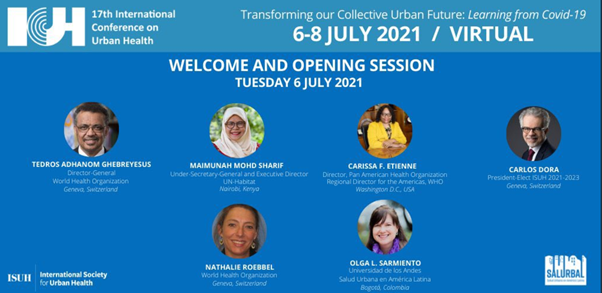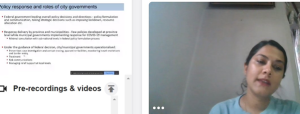
Covid & Cities Blog – 2nd in the series
Role of the private sector in COVID-19 response in urban areas: Lessons from Ghana, Nepal, Nigeria and Bangladesh.
by Helen Elsey
The 17th International Conference on Urban Health (ICUH) was held on 6-8 July 2021. A key theme of the conference was urban governance and public health systems in the time of COVID-19. CHORUS – Community-led Effective and Responsive Urban Health Systems –a research consortium hosted one of the panel sessions in the conference. CHORUS is a research consortium that aims to identify health system solutions for urban health challenges in cities in Ghana, Nepal, Nigeria and Bangladesh to improve the health of the urban poor. From 30th January 2020, when WHO announced COVID-19 as a global pandemic, to September, CHORUS partners conducted detailed policy and media reviews to understand the response of the private sector to COVID-19. They were particularly looking for examples of the interactions between different levels of government, at city and national level and the private sector, and the effects of these interactions on the wellbeing of the urban poor.
This year’s ICUH presented a timely opportunity for CHORUS researchers to share insights from these reviews. Our panel of senior researchers from across CHORUS were able to tease out key lessons for urban governance during COVID, and as Irene Agyepong (CHORUS CEO) highlighted in her blog, future pandemics which are inevitable.
Individual country experiences of private sector’s responses to the pandemic
It is now very clear that COVID-19 has exposed the fault lines and inequities in all of our societies. So, what impact have the actions of the private sector had on the poorest people within cities? With limited public primary care in many LMIC cities, the urban poor must take their chances with the private sector. Deepa Barua from ARK Foundation highlighted how the private health-care sector had a disproportionate impact on the urban poor in Bangladesh during the pandemic, with price hikes and requirements for COVID-19 tests freezing out poorer patients from private health providers. This was a common theme. Chinyere Mbachu, from the Health Policy Research Group, University of Nigeria described how tests could cost up US$90 in private laboratories in Nigeria. Given the impacts of COVID-19 on the daily-wage work and small businesses that so many city residents rely on, these high costs further exacerbated poverty and inequities. There were examples of private hospitals refusing to treat those with suspected COVID-19, leading to increase in patient deaths between May- July 2020 in Nepal, as noted by Shophika Regmi from HERD International. Across the countries, there were reported events of fake COVID-19 test certificates and N95 masks, as well as lack of safety procedures in private hospitals. Such events meant that some in the sector profited unethically from the pandemic, exposing more persons to contracting the virus.
Our concern
With limited public primary health care in many LMIC cities, the urban poor are left to take their chances with the private sector. Given the impacts of COVID-19 on the daily-wage work and small businesses that so many city residents rely on, these high costs further exacerbate poverty and inequities, driving many below the poverty line. Hence the need to improve the capacity of the private sector, as well as monitoring. That way, they can optimally deliver affordable and quality health services under safe conditions.
Good deeds of the private sector
On the flipside, there is something to cheer. The panel members urged everyone, especially the public sector to see that this is only half the picture. Indeed, the private-for-profit sector is not driven by profit alone. Across the CHORUS countries some private-for-profit companies contributed to public funds, such as CACOVID (Nigeria) and the Corona Infection Prevention, Control and Treatment Fund (established by the Council of Ministers in Nepal). Lauren Wallace and the CHORUS team in Ghana explained how multiple private sector actors, from banks to private foundations and telecoms companies, took actions to protect their customers and the general public from economic hardships. The pandemic has enabled many larger for-profit enterprises to show the extent of their social responsibility, and the importance of this is something that the public sector would do well to remember.
Why governments should against all odds, embrace the private sector
Speakers highlighted the challenges and complexities facing government in coordinating and regulating the activities of this diverse, myriad of private providers. In Ghana, and in other contexts, there was considerable public coordination of private and public funding and provision for food, loans, lab tests and patient care. Frequently, this involved not only the ministries of health, but other sector ministries such as the Department of Tourism (Nepal), the Ministry of Transport (Nigeria), the Ministry of Interior (Ghana) and the armed forces and Ministry of Local Government, Rural Development and Co-operatives in Bangladesh. Yet, often government responses were seen as slow and with limited effectiveness, undermining the allocation and use of the considerable financial and material resources provided by private sector actors. Identifying geographic or service gaps in provision was a particular challenge and panellists highlighted that while poor communities may have benefited from private sector action, this was often unequal due to the lack of coordination by government actors and in some cases, political bias in the distribution of relief items.
The overriding message from the panel was that the private sector is just too important to ignore, and governments at all levels need to make a concerted effort to engage, and quickly. Creating space and structures to hear the voices of communities was seen as fundamental by panellist Sushil Baral from HERD International, who called for an accountability framework to support communities to hold organisations – public, NGO and private – to account and alert decision-makers to gaps in provision.
A call to action
Panellists called for collective responsibility across multiple levels of government. This means recognising the role of city governments. However, as Rumana Huque from the ARK Foundation explained in Bangladesh, which has a centralised system of government, responsibilities for coordination and regulation may have shifted to local, city governments, but until resources follow suite, local authorities are unable to take action and implement the policies. Newly federalised Nepal has the potential to show the extent to which city (municipal) governments can begin to take ownership of coordination and regulation of the diverse private sector. But the panellists agreed that these changes take time. They called for progressive decentralisation, strengthening capacities among local government officers to engage with, understand the role of the private sector and where appropriate, develop context specific regulatory frameworks.
Conclusion
The need for government at all levels to understand and engage with private sector is a prerequisite for urban health. As Dr Huque pointed out, two thirds of hospital beds in Bangladesh are in the private sector. Governments must work with the private sector in all its complexity. Identifying the plethora of organisations within the sector and how different types of organisations may influence the health and well-being of urban residents, particularly the urban poor is key. To make progress, there is a clear need to challenge old assumptions, building new understandings of the range of motivations driving the actions of different private sector actors. It is only with this nuanced understanding that the power of the private sector can be harnessed to improve urban health.
Our team at ICUH ’21
Chair:
The session was chaired by Professor Zahidul Quayyum from the James P Grant School of Public Health, BRAC, Bangladesh.
Our presenters:
1) Within the context of federalisation, the changing roles of municipalities and private sector engagement in COVID-response and its impact on city residents in Nepal.
Shophika Regmi : HERD International, Nepal
2) Contributions of the government and private sectors towards alleviating covid-19 impacts, governance challenges and implementation disconnects encountered by city governments and the urban poor.
Lauren J. Wallace: School of Public Health, University of Ghana
3) The novel contribution of the private sector in a multi-sector response to COVID-19 in Nigeria, the challenges of coordination and transparency in managing financial and material resources and implications for vulnerable urban dwellers.
4) The role of city government and private sectors (for-profit and NGOs) in tackling the crisis of COVID-19 in Bangladesh, coordination and synergies across different ministries at central and city levels.
Our panellists:
Rumana Huque: ARK Foundation, Bangladesh
Sushil Baral: HERD International, Nepal
Irene Agyepong: Ghana College of Physicians and Surgeons
Helen Elsey is a Senior Lecturer in Global Public Health in the Department of Health Sciences, University of York and CHORUS Research Co-Director


